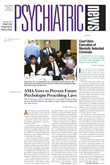Shaping the standards of professional ethics is one of the most important functions of a medical association. The American Psychiatric Association fulfills that role in two major ways. APA’s
Annotations to the Principles of Medical Ethics constitutes the code of ethics for APA members, and is frequently relied on by licensing boards and the courts in adjudicating complaints about professional behavior. In addition, in collaboration with its district branches, APA itself reviews complaints against members who are alleged to have breached their ethical responsibilities. As important as both these functions are, it has become clear that they could each be done better.
The Annotations is an important but imperfect document. Its organization, using the framework of the AMA’s Code of Medical Ethics, is at best difficult to follow. Since the individual annotations typically have been developed in much the same way as the common law—in response to particular cases—their coverage is spotty. One annotation addresses the use of acupuncture by psychiatrists, not a burning issue in the field, while there are no annotations covering child psychiatry or the conduct of research. As someone who uses the Annotations to teach the ethics of psychiatry to residents, I can testify to the difficulty of employing them for pedagogic purposes. American psychiatry would benefit from a more comprehensive, modern, and user-friendly set of annotations for the 21st century.
Last year the APA Board of Trustees approved the appointment of a task force to revise and update our Annotations. The task force’s goal is not to alter our ethical principles, but to express them more clearly and to identify their implications for the common areas of psychiatric practice. Laura Roberts, M.D., an associate professor of psychiatry at the University of New Mexico and an accomplished scholar of the ethics of psychiatry, now chairs the task force, which consists of psychiatrists of diverse backgrounds with extensive contact with ethical issues. As its work moves toward completion, the task force will be seeking feedback from the APA membership, and the final product will be subject to careful review by the APA Assembly and Board.
As the work of updating our Annotations was getting under way, APA President Richard Harding, M.D., appointed a second task force on ethics regulation and ethics education. The task force was charged with examining the balance between education and enforcement in APA’s ethics activities. A number of concerns have been expressed in recent years about ethics enforcement at APA. Critics felt it was too costly and difficult to conduct in a fair way, and it tended to promote an adversarial relationship between APA and its members. Some urged that APA eliminate ethics enforcement entirely, focusing on ethics education, as do most specialty organizations. Under this model, all complaints against members would be referred to state licensure boards for investigation and adjudication.
In an extensive report that was presented to the Board of Trustees at its June meeting, the task force, chaired by former Assembly speaker and former Ethics Committee chair Jeremy Lazarus, M.D., offered a thorough analysis of the situation and possible options (see
page 4). The data that the task force collected showed that the number of ethics complaints, and hence the cost of the process for district branches and APA alike, have fallen steadily over the last decade. This held true as well for cases reaching the APA’s Ethics Appeals Board. Ethics-related litigation against APA—which is an expensive burden for the organization despite our consistent record of success—has also diminished sharply. In sum, the cost of ethics enforcement is less than often thought and has been decreasing.
The task force suggested that the benefits of an ethics enforcement process, which includes reinforcing our professional identity and psychiatry’s public image, argued for retaining ethics enforcement as part of what APA does for the field. However, the task force recommended the adoption of a statute of limitations for complaints based on behaviors that allegedly occurred many years before and other procedural changes, as well as the development of an alternative educational process that would allow some complaints to be handled in a nonadversarial fashion. District branches would be given the option of using either or both approaches: sanction-based enforcement or nonadversarial proceedings with an educational outcome.
Many of the details of the task force’s recommendations remain to be fleshed out. However, the Board voted to endorse the task force’s approach in principle and to request the task force to return with a final report. Since many district branches appear to have been moving in the direction of diverting cases to a more educational process already, the task force’s work reflects a continuation of the organic evolution of our ethics procedures.
Stay tuned over the next year for more information about the revision of our Annotations and the changes to APA’s ethics enforcement process. ▪

